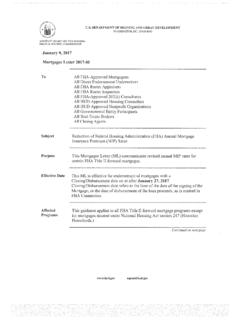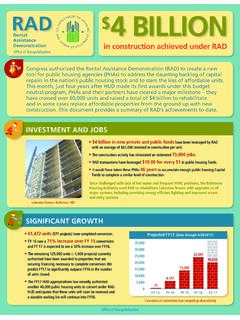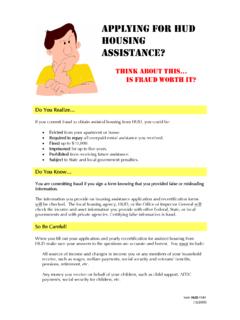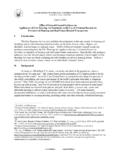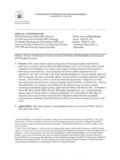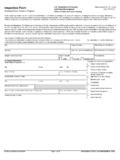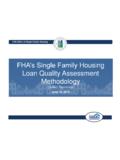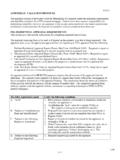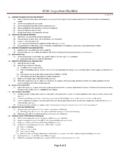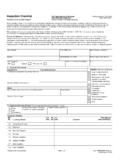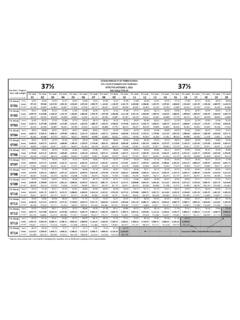Transcription of SPECIAL ATTENTION OF: FHEO-2020-01
1 DEPARTMENT OF HOUSING AND URBAN DEVELOPMENT. WASHINGTON, DC 20410-2000. OFFICE OF FAIR HOUSING. AND EQUAL OPPORTUNITY. SPECIAL ATTENTION OF: HUD Regional and Field Office Directors of fheo Notice: FHEO-2020-01 . Public and Indian Housing (PIH); Housing; Issued: January 28, 2020. Community Planning and Development Expires: Effective until Amended, (CPD); Fair Housing and Equal Opportunity; Superseded, or Rescinded. and Regional Counsel; CPD, PIH, and Housing Program Providers Subject: Assessing a Person's Request to Have an Animal as a Reasonable Accommodation Under the Fair Housing Act 1. Purpose: This notice explains certain obligations of housing providers under the Fair Housing Act (FHA) with respect to animals that individuals with disabilities may request as reasonable accommodations. There are two types of assistance animals: (1) service animals, and (2) other trained or untrained animals that do work, perform tasks, provide assistance, and/or provide therapeutic emotional support for individuals with disabilities (referred to in this guidance as a support animal ).
2 Persons with disabilities may request a reasonable accommodation for service animals and other types of assistance animals, including support animals, under the FHA. This guidance provides housing providers with a set of best practices for complying with the FHA when assessing requests for reasonable accommodations to keep animals in housing, including the information that a housing provider may need to know from a health care professional about an individual's need for an assistance animal in housing. This guidance replaces HUD's prior guidance, fheo -2013-01, on housing providers' obligations regarding service animals and assistance animals. In particular, this guidance provides a set of best practices regarding the type and amount of documentation a housing provider may ask an individual with a disability to provide in support of an accommodation request for a support animal, including documentation of a disability (that is, physical or mental impairments that substantially limit at least one major life activity) or a disability-related need for a support animal when the disability or disability-related need for the animal is non-obvious and not known to the housing provider.
3 By providing greater clarity through this guidance, HUD seeks to provide housing providers with a tool they may use to reduce burdens that they may face when they are uncertain about the type and amount of documentation they may need and may be permitted to request when an individual seeks to keep a support animal in housing. Housing providers may be subject to the requirements of several civil rights laws, including but not limited to the FHA, Section 504 of the Rehabilitation Act (Section 504), and the Americans with Disabilities Act (ADA). This guidance does not address how HUD will process complaints against housing providers under Section 504 or the ADA. 2. Applicability: This notice applies to all housing providers covered by the 3. Organization: There are two sections to this notice. The first, Assessing a Person's Request to Have an Animal as a Reasonable Accommodation Under the Fair Housing Act, recommends a set of best practices for complying with the FHA when assessing accommodation requests involving animals to assist housing providers and help them avoid violations of the FHA.
4 The second section to this notice, Guidance on Documenting an Individual's Need for Assistance Animals in Housing, provides guidance on information that an individual seeking a reasonable accommodation for an assistance animal may need to provide to a housing provider about his or her disability-related need for the requested accommodation, including supporting information from a health care professional. Questions regarding this notice may be directed to the HUD Office of Fair Housing and Equal Opportunity, Office of the Deputy Assistant Secretary for Enforcement and Programs, or your local HUD Office of Fair Housing and Equal Opportunity. _____. Anna Mar a Far as, Assistant Secretary for Fair Housing and Equal Opportunity 1. The Fair Housing Act covers virtually all types of housing, including privately owned housing and federally assisted housing, with a few limited exceptions.
5 2. Assessing a Person's Request to Have an Animal as a Reasonable Accommodation Under the Fair Housing Act2. The Fair Housing Act (FHA) makes it unlawful for a housing provider3 to refuse to make a reasonable accommodation that a person with a disability may need in order to have equal opportunity to enjoy and use a One common request housing providers receive is for a reasonable accommodation to providers' pet or no animal policies so that individuals with disabilities are permitted to use assistance animals in housing,5 including public and common use areas. Assistance animals are not pets. They are animals that do work, perform tasks, assist, and/or provide therapeutic emotional support for individuals with There are two types of assistance animals: (1) service animals, and (2) other animals that do work, perform tasks, provide assistance, and/or provide therapeutic emotional support for individuals with disabilities (referred to in this guidance as a support animal ).
6 7 An animal that does not qualify as a service animal or other type of assistance animal is a pet for purposes of the FHA and may be treated as a pet for purposes of the lease and the housing provider's rules and policies. A housing provider may exclude or charge a fee or deposit for pets in its discretion and subject to local law but not for service animals or other assistance 2. This document is an integral part of Department of Housing and Urban Development Office of Fair Housing and Equal Opportunity Notice FHEO-2020-01 , dated January 28, 2020 (sometimes referred to as the Assistance Animal Notice ). 3. The term housing provider refers to any person or entity engaging in conduct covered by the FHA. Courts have applied the FHA to individuals, corporations, partnerships, associations, property owners, housing managers, homeowners and condominium associations, cooperatives, lenders, insurers, real estate agents, brokerage services, state and local governments, colleges and universities, as well as others involved in the provision of housing, residential lending, and other real estate-related services.
7 4. 42 3604(f)(3)(B); 24 Unless otherwise specified, all citations refer to those authorities effective as of the date of the publication of this guidance. 5. For purposes of this guidance, the term housing refers to all housing covered by the Fair Housing Act, including apartments, condominiums, cooperatives, single family homes, nursing homes, assisted living facilities, group homes, domestic violence shelters, emergency shelters, homeless shelters, dormitories, and other types of housing covered by the FHA. 6. See 24 (a). 7. Under the FHA, a disability is a physical or mental impairment that substantially limits one or more major life activities. See 24 8. See Joint Statement of the Department of Housing and Urban Development and the Department of Justice, Reasonable Accommodations Under the Fair Housing Act ( Joint Statement ), Q and A 11.
8 (May 17, 2004), at ; Fair Hous. of the Dakotas, Inc. v. Goldmark Prop. Mgmt., 778 F. Supp. 2d 1028 ( 2011). HUD views the Joint Statement as well-reasoned guidance on some of the topics addressed in this guidance. The Joint Statement, available to the public since 2004, has been cited from time to time by courts. See, , Bhogaita v. Altamonte Heights Condo. Ass'n, 765 1277, 1286 (11th Cir. 2014); Sinisgallo 3. As of the date of the issuance of this guidance, FHA complaints concerning denial of reasonable accommodations and disability access comprise almost 60% of all FHA complaints and those involving requests for reasonable accommodations for assistance animals are significantly increasing. In fact, such complaints are one of the most common types of fair housing complaints that HUD receives. In addition, most HUD charges of discrimination against a housing provider following a full investigation involve the denial of a reasonable accommodation to a person who has a physical or mental disability that the housing provider cannot readily HUD is providing this guidance to help housing providers distinguish between a person with a non- obvious disability who has a legitimate need for an assistance animal and a person without a disability who simply wants to have a pet or avoid the costs and limitations imposed by housing providers' pet policies, such as pet fees or deposits.
9 The guidance may also help persons with a disability who request a reasonable accommodation to use an assistance animal in housing. While most requests for reasonable accommodations involve one animal, requests sometimes involve more than one animal (for example, a person has a disability-related need for both animals, or two people living together each have a disability-related need for a separate assistance animal). The decision-making process in this guidance can be used for all requests for exceptions or modifications to housing providers' rules, policies, practices, and/or procedures so persons with disabilities can have assistance animals in the housing where they reside. This guidance is provided as a tool for housing providers and persons with a disability to use at their discretion and provides a set of best practices for addressing requests for reasonable accommodations to keep animals in housing where individuals with disabilities reside or seek to reside.
10 It should be read together with HUD's regulations prohibiting discrimination under the FHA10 with which housing providers must comply and the HUD/Department of Justice (DOJ). Joint Statement on Reasonable Accommodation under the Fair Housing Act, available at A housing provider may also be subject to the Americans with Disabilities Act (ADA) and therefore should also refer to DOJ's regulations implementing Title II and Title III of the ADA at 28 parts 35 and 36 , and DOJ's guidance on service animals, Frequently Asked Questions about Service Animals and the ADA at and ADA Requirements: Service Animals at This guidance replaces HUD's prior guidance on housing providers' obligations regarding service animals and assistance Housing v. Town of Islip Hous. Auth., 865 F. Supp. 2d 307, 336-42 ( 2012). However, HUD does not intend to imply that the Joint Statement is independently binding statutory or regulatory authority.
